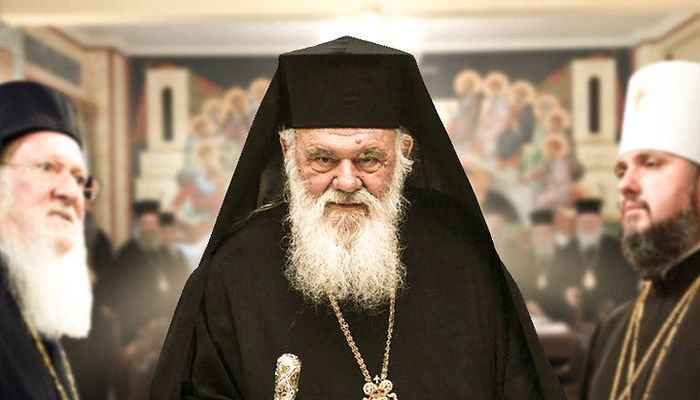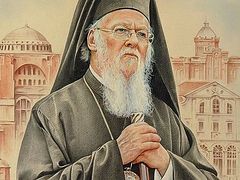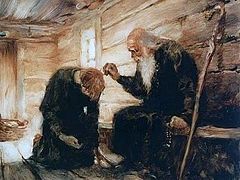Orthodox Synaxis has again provided the English-speaking Orthodox world with a vital translation, this time of an open letter from 179 Greek clergy and laity to their hierarchs. Among the signatories are sixteen archimandrites, twelve protopresbyters, one priest, two monks, three nuns, and 145 laymen. The Greek original with the list of signatories can be found here.
***
Your Beatitude, Archbishop Ieronymos of Athens and All Greece,
Most Reverend Metropolitans of the Church of Greece,
Your Beatitude,
Your Eminences,
As members of the Orthodox Church and, in spirit, children of Your episcopal-fatherly responsibility, we feel the need to address You as our spiritual and ecclesiastical Fathers and to express our unease and distress over the uncanonical granting of Ukrainian autocephaly.
We share Your anguish and serious ecclesiological and canonical hesitations and reservations as they have been stated expressly or even silently according to the spirit of Your own pastoral discrimination. We are also aware of the pressures that the Church of Greece and Her Hierarchs are under from various ecclesiastical and other factors. We want to believe that the healthy spiritual antibodies of our Bishops will confront the attacks of outside bodies.
Certainly, we honor and respect the Ecumenical See of Constantinople as having precedence of honor and being the first see among the Orthodox Churches. Undeniably, the primacy of honor as granted by the Ecumenical Councils remains unchanged forever.
Constantinople’s precedence of honor exists and is exercised exclusively within the spiritual synodical-hierarchical system of communion of the Orthodox Churches and not outside and above it. It consists chiefly of coordinating the Orthodox Churches on critical issues of inter-Orthodox interest, presiding over inter-Orthodox and Pan-Orthodox meetings and Synods, and expressing and implementing the decisions that have been taken after Pan-Orthodox consultation.
Outside intervention and intrusion, even for addressing a serious problem, in a foreign jurisdiction without the consent– let alone contrary to the unanimity– of the other local Churches has no basis in the Orthodox interpretation of precedence of honor, but rather constitutes an alteration and misinterpretation of it. Any attempt to impose such an interpretation will, unfortunately, have the most serious ecclesiological consequences, immediately resulting in the loss of honorary primacy. The famous example of Elder Rome, which had primacy in the early Church, demonstrates the seriousness of this issue. The misinterpretation and attempted transformation of precedence of honor into primacy of authority corrupts Orthodox ecclesiology and leads it to papism, with disastrous consequences.
As Greeks by origin, we honor and respect the Patriarchate of the Race [τὸ Πατριαρχεῖο τοῦ Γένους] when it speaks the truth in love. We are saddened because today we see It, on account of the incorrect choice of Its Leadership, running the risk of becoming isolated and losing Its coordinating role in inter-Orthodox relations and the expression and implementation of the will of the Local Orthodox Churches. Further insistence on incorrect choices will only have worse consequences for the See.
The Ecumenical Patriarchate has the right to grant autocephalies and the Church of every nation has the right to rise to autocephaly, only under the clear and strict traditions that ecclesiastical Tradition has established, consistent with Orthodox ecclesiology and canonical Order, which were not respected in the case at hand.
We cannot share the view that has been expressed, that any denial of the granting of Autocephaly to Ukraine puts the autocephalies of the 19th and 20th centuries into dispute. This assertion has no canonical or historical foundation. There is not the slightest affinity between Ukrainian autocephaly and the autocephalies of the other Churches, since:
The Autonomous Ukrainian Orthodox Church under Metropolitan Onufry, which is recognized by all the Orthodox Churches, even the Ecumenical Patriarchate, and has 90 bishops, some 12,000 parishes, 250 monasteries, 5,000 monks and nuns and millions of faithful did not request autocephaly. The canonical Church, having every right to do so, did not request and did not receive autocephaly. Is it possible to force it with violence or to punish it because it did not accept it?
While everyone, even the Ecumenical Patriarchate, accepts the presence of Metropolitan Onufry and the 90 bishops (there has been no canonical act of deposition or dismissal against them), a parallel ecclesiastical structure has been created alongside the canonically existing one. Do we blame (and rightly so) the parallel jurisdictions in the in the Diaspora while at the same time implementing them within the boundaries of the Churches?
The Church of Ukraine canonically belongs to the Patriarchate of Russia and not to that of Constantinople. Until now, all Constantinople’s autocephalies were granted in areas of Its jurisdiction.
Almost all the Local Churches harbor very serious reservations about the canonicity and validity of the new church’s priesthood. Indeed, 15 out of its roughly 50 bishops received their “priesthood” from self-ordained individuals! Such a thing has never happened before!
No Orthodox Church has recognized autocephaly granted in this manner, an event without precedent in ecclesiastical history!
It is extremely sad for us to find that where previously, despite political interests and even in extremely difficult periods, the Ecumenical See and Its Holy Patriarchs struggled for the unity of the Russian peoples under one spiritual and ecclesiastical administration, today it gives in to temptations and transatlantic pressures and seeks to separate them by force, involving the Orthodox Church in geopolitical interests and turning the Church of Christ into a element of geopolitical configurations and problems. Any recognition of autocephaly on the part of the Church of Greece alone, without a Pan-Orthodox decision, will place our local Church on the geopolitical chessboard.
The region of Ukraine (in ecclesiastical sources it is generally referred to as “Little Russia”), belonged to the Ecumenical See from 988 to 1686. With the Patriarchal Praxis of Patriarch Dionysios IV, it was placed canonically under the Patriarchate of Moscow. The Ecumenical Patriarchate itself interpreted the Patriarchal Praxis as a full transfer for 332 years! This certainty has been accepted in a variety of ways by the Ecumenical Patriarchate itself and has been recorded in a more formal way in the Typika of the 17th century, in the Constitutions of 1797 (St Gregory V), 1829, 1855, 1896 and 1902, which were issued “in Constantinople by the Patriarchal Press,” and in the Patriarchal Calendars up to 2018! This same certainty has also been registered by officials of the Ecumenical See (Archiophylax Kallistos Delikanes, the professors Metropolitan Kallistos Ware (Oxford), protopresbytr Theodore Zissis (Thessaloniki), Basilios Stavridis (Chalki), Gregorios Laurentzakis (Vienna), Vlasios Fidas (Athens-Chambesy)), as well as by Patriarch Bartholomew himself, both in writing and in His formal speech in Kiev. This is how the Ecumenical Patriarchate itself interpreted the Patriarchal Praxis of 1686 for 332 years!
And most crucially: this is how Pan-Orthodox consciousness has interpreted the Patriarchal Praxis for 332 years! From the famous Constitution of the Patriarch of Jerusalem Chrysanthos (Notaras) of 1715 until 2019, all of the Typica, Calendars and Yearbooks of all the Local Orthodox Churches have regarded Ukraine as part of the Church of Russia. Who can lightheartedly disdain Pan-Orthodox ecclesiastical tradition and praxis? Who has the right to stand above Pan-Orthodox consciousness?
We express our utmost concern because worries about the canonical non-existence of the new church’s “priesthood” have not been answered convincingly. Certainly, under strict conditions, the Church can exercise economy with ordinations performed in schism and heresy. Nevertheless, how does our Orthodox Church express it? In the Orthodox Church, we do not have a papal see that does what it likes and everyone must obey! Rather, the local Churches in Council under the presidency of Constantinople decide on the remedy for the schism and exercise economy with the ordinations! When, however, all the local Churches have refused to recognize such a “priesthood”, with what canonical right can Constantinople claim that as Primate it expresses the Church and exercises economy with ordinations performed in schism? Constantinople is not above the common opinion of all the local Churches. He is not the pope who expresses the Orthodox Church ex cathedra, separately from the opinion of all his peers.
Unfortunately, however, the new church’s ordinations do not only come from the defrocked and anathematized Filaret, whose defrocking and anathematization has been recognized by the whole of Orthodoxy for 26 years (even by the Ecumenical Patriarch himself), but also come from a self-ordained former deacon who was never ordained to the priesthood or episcopate, the common criminal Victor Chekalin. In God’s name, how is it possible for us to recognize as the Church of Greece self-ordained individuals? Until now, we have been boasting about the apostolic succession of the Orthodox Hierarchy. Is it possible, with the recognition of Chekalin’s “ordinations”, for us to continue proclaiming the apostolic succession of the Orthodox Hierarchy?
How, then, was the “priesthood” of the self-ordained “healed”? Can Constantinople alone, just with a praxis, heal the absence of apostolic succession? The justifications that supporters of autocephaly have deployed are so contradictory and self-defeating that they not only are not convincing about the existence of a canonical ordination of the self-ordained, but rather confirm the lack of valid apostolic succession. Having said this, with what hierarchical consciousness can a bishop recognize such “ordinations”? This is not about questioning the moral purity of any persons, but rather about the ontological nonexistence of the very inner kernel of the Episcopacy: we do not have an ethical, but rather an ontological “defilement” of the episcopal body at the Pan-Orthodox level.
We cannot understand how, without the common decision of all the Local Churches, a hodgepodge of defrocked, anathematized, self-ordained schismatics, who have not demonstrated repentance by any action, has been restored and brought together at a “unifying council”, at the same time receiving “autocephaly”, while the canonical bishops, who form a canonical synod which expresses the canonical Church, were completely scorned.
The new church’s leadership provides no assurance of reliability, seriousness and ecclesiastical ethos (see the statements of its “primate” Epiphany about the USA, LGBT rights, cooperation with the Uniates, his participation in the unveiling of the memorial to the self-ordained “Metropolitan of Kiev” Vasyl Lypkivsky, etc.). The breaking away of “honorary patriarch” Filaret and some “bishops” from the new church and his serious complaints demonstrate in the most tragic way the failure to heal the Ukrainian schism because there was no repentance on the part of the schismatics, the most necessary condition for the healing of schisms.
There is no way that we can justify the granting of autocephaly as a punishment against the Russian Patriarchate for “arrogance”, “anti-ecclesiastical acts”, “worldliness”, etc. It is not possible to use autocephalies as punishments against people who misbehave because neglecting and violating the sacred canons does not lead to real and lasting solutions to ecclesiastical problems. In the final analysis, what problem does Constantinople have with Moscow that it can heal (?) by declaring an entire synod of 90 bishops to be illicit? How can it scorn an entire church with 12,000 parishes and millions of believers? Did You Hierarchs not celebrate the liturgy with the Most Reverend Onufry and the Holy Synod around him when you went to to Kiev? Did you not recognize him as the sole canonical Metropolitan of Kiev? So now they are calling on You to erase him and recognize someone else in his place? What canonical basis do these demands have?
We stand with great respect and express our full sympathy and support for the millions of members of the canonical Orthodox Church in Ukraine, which is experiencing sorrows and persecutions because they wish to remain in the Church in which they were born and raised. The machinations and persecutions of state and quasi-state mechanisms against the canonical Church in Ukraine in order to force the clergy and faithful into the new church prove the autocephaly’s failure and that it was not a demand from the faithful. How, then, will the Church of Greece, instead of sympathizing with persecuted believers, recognize that which the vast majority of Ukrainian Orthodox believers have rejected?
Finally, the most worrying thing is that the ecclesiastical problem of Ukraine is evolving from a problem of a canonical nature into a major ecclesiological problem on account of the tireless effort to mutate the honorary precedence of the Ecumenical Patriarchate into a primacy of authority of a papal sort:
a) Unfortunately, the Ecumenical Patriarch, in the case of Ukrainian autocephaly, rejects His coordinating role recognized by tradition in the expression and implementation of conciliar decisions of the local Orthodox Churches, and for this reason refuses to convene a Pan-Orthodox Council or a Synod of Primates.
b) To the contrary, like the pope:
i) He acts imperiously in foreign jurisdictions belonging to the Church of Russia, as He Himself had until recently recognized.
ii) He decides sovereignly and independently or even contrary to the opinion not only of the Church of Ukraine itself, but of the local Orthodox Churches.
iii) He asserts that the other Orthodox bishops the world over are obliged to accept His decision.
iv) He believes that His decision does not need approval from the other Churches but is unencroachable and irrevocable.
v) He is required to intervene in the Orthodox Church throughout the Ecumene “ex officio and out of obligation”, “not only in cases of Doctrine, holy Tradition, and Canonical Church Regulations, or even of general matters concerning the entire body of the Church, but also in all matters pertaining to important issues of specific interest to one or another Local Church” (The Letter of Ecumenical Patriarch Bartholomew to Archbishop Anastasios of Albania, February 20, 2019). This patriarchal phraseology is reminiscent of the famous Dictatus Papae of Pope Gregory VII (1075) which insisted that all “causae maiores” of the Churches throughout the world be submitted to the pope for resolution!
It is more than obvious that if– may it not be so– this approach prevails, there will be serious and sorrowful developments in our Orthodox Church.
Your Beatitude,
The difficulty that the Standing Holy Synod in the outgoing period has had with quickly and summarily “closing on” such a problematic autocephaly and Your subsequent statement that You are “unable” to take on the burden of such a decision demonstrate the prudence as well as the great humility of our ecclesiastical Leaders. At the same time it shows that in the consciousness of the Greek Hierarchs, the vows they made before the Holy Altar at their ordination to the episcopacy remain fresh, when they promised before God and His Church that they would abide by the Sacred Canons, Ecclesiastical Order and the unity of the Orthodox Church throughout the world.
Since abuse of the sacred institution of autocephaly, instead of serving the unity and stability of the Holy Churches of God, tends to cast aside the unity in freedom of our Orthodox Church, making Her into a laughingstock in the eyes of Her enemies, we think that it also cannot be ratified by the Synod of the Hierarchy of the Church of Greece. Why, then, does the Church of Greece alone first take on such a decision Herself, contradicting the ecclesiastical consciousness of all the Local Churches in order to satisfy the Phanar’s erroneous and failed choices? Why should she scandalize the souls of the millions of Ukrainian Orthodox faithful who contend with deprivation and persecution and remain faithful to their ecclesiastical tradition? Finally, why should she scandalize the souls of millions of faithful from all the local Orthodox Churches who hold the Church of Greece in high regard and have as a point of reference? We think that it will not render good services either to Herself, to the Ecumenical See, or to Ecumenical Orthodoxy.
We are certain that our spiritual fathers will not disappoint us and that they will view Orthodox ecclesiology and canonical order as the only criteria for solving the Ukrainian problem.
September, 2019





